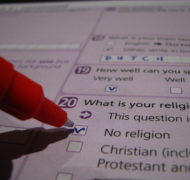Faith at the Firing Line
Blog / Produced by The High Calling
In this article from our series Called to the Firing Line, author Glynn Young describes three ways his faith helped him survive an extremely stressful career. "My faith and the attitude springing from it," he writes, "[often] changed the conversation."
In less than two weeks, I’ll be retiring from my day job, and I’ve been looking back at some thirty-seven years in corporate communications.
Most of my work has centered in the oil, chemical, and agriculture industries; none of them lack controversy or crisis. My career has largely been spent on the firing line.
At times, it felt like the firing squad.
Government and regulatory issues. Environmental problems. Product crises. Transportation accidents. Public protests. “He said/she said” litigation. Even the short time I worked in a non-corporate environment for the St. Louis Public Schools, it was much the same. There, I dealt with restructurings, school closings, layoffs, protests at school board meetings, and teacher sick-outs.
While I treasure the oases of relative calm when my jobs consisted largely of writing speeches for executives, those also had their firing line/firing squad moments. Corporate executives are not the easiest people to work for.
The Difference Faith Makes
Whatever success I have had and how well I managed to survive physically and professionally, I attribute to two things: my wife and my faith. My wife provided a refuge, a sympathetic ear, a shoulder to cry on. No one saw the toll my jobs took like my wife did. My faith, combined with my journalism training, framed my career on the firing line in ways I didn’t anticipate.
First, I learned to question everything. I developed a good “horse feathers” detector, meaning I knew when I was being given a line and when I wasn’t. If I was the one standing in front of news media or chanting protesters, I wanted to have accurate information. At the school district, for example, any time I heard someone say, “It’s for the good of the children,” my internal alarm would go off; that told me it was more likely about something different.
Having that alarm often made for tense moments. Fairly early on, I was labeled as a “conscientious objector” and not a total team player.
All People are Made in God’s Image
Second, my faith taught me that situations, events and issues are rarely straightforward and clearly right or wrong. Life is murky and often doesn’t have clear answers.
Twenty years ago, the company I worked for found itself needing to talk with representatives of Greenpeace. I was part of the company team assigned to meet with them. I decided that I was going to like the Greenpeace representatives. In addition to researching them, I understood that no matter how wide the differences between us were, they were people who, like me, were made in God’s image.
Months later, one of the Greenpeace people who’d been at the meeting told me they hadn’t known what to make of me: someone who was genuinely interested in what they had to say. My faith and the attitude springing from it had changed the conversation.
Living out the Golden Rule at Work
Third, my faith has enabled me to tell people difficult things. Years ago, I was brought into a controversy that had paralyzed plans for a manufacturing facility. I listened to the company people express outrage after outrage over a small group of people standing in their way. They simply did not understand why people would be so adamantly against something that would bring jobs and tax revenues.
During a telephone conference call, I asked a question: “Would you buy a home directly across the street from the facility? If your two-year-old daughter had asthma, would you be concerned about increased truck traffic on gravel roads?”
After a lengthy silence, the company people began talking about alternatives. The facility was eventually built in an industrial park, and the company was broadly commended for being so open and willing to work with the community.
The questions I'd asked in that conference call came from my faith and Jesus’ command to treat others how I wanted to be treated.
Attempting to live one’s faith in the firing line is never, never easy. It’s often the route of most resistance. You can make people angry with you—and you’re not likely to be promoted to vice president.
But there’s really no other way.





